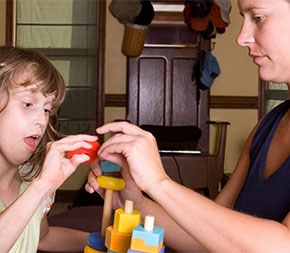
Pediatric Occupational Therapist at a Glance
Is a Pediatric Occupational Therapy Job for You?
Pediatric occupational therapy focuses on helping children develop the skills they need to grow into functional, independent adults. Physical impairment, injuries and a host of other issues can hamper a child’s ability to perform common tasks or progress normally through the stages of social or cognitive development. The longer a child goes without learning these skills, the more the problem compounds as the child ages—which makes the skills of a pediatric occupational therapist critical to their patients.
Patient Profiles
Pediatric occupational therapy can benefit children who fall into several categories, from premature infants, to kids with ADHD, to children struggling to read or write. What areas can pediatric occupational therapy address? Consider the following list:
Equipment and Methods
When working with children, pediatric occupational therapists often incorporate play into practice as a way of motivating them and reducing any anxiety or fears they might feel toward therapy. Play can involve games, toys, puzzles, songs, or physical exercises. In all cases, the goal of pediatric occupational therapy is not only to help children adequately progress but to challenge them appropriately, helping to build self-esteem and confidence when it comes to their capabilities and aptitude.
Pediatric OT Work Setting and Salary
Pediatric occupational therapists work in several kinds of environments:
Usually, occupational therapists work 40-hour weeks, with some jobs requiring travel to different therapy facilities or even patient homes.
According to the U.S. Bureau of Labor Statistics’ 2023 Occupational Employment Statistics, the median annual salary for pediatric occupational therapists is $96,370. Actual salaries may vary greatly based on specialization within the field, location, years of experience and a variety of other factors. National long-term projections of employment growth may not reflect local and/or short-term economic or job conditions, and do not guarantee actual job growth. Here are salaries for your state:
Certification and Training
Typically, pediatric occupational therapists must hold a master’s degree from an accredited university and pass a national licensure exam in order to enter the field. Most master’s degree programs in pediatric occupational therapy take two years to complete and incorporate crucial hands-on training as part of the overall curriculum.
The National Board for Certification in Occupational Therapy (NBCOT) provides information on the occupational therapy licensure exam, fees and content. Beyond national licensure, therapists can pursue voluntary certification.
Change Children’s Lives
Growing into a self-sufficient adult may be easy for some. Others, though, need a hand. Whether that hand teaches them to write better, to speak more clearly or to gain specific physical control, it helps them reach maturity with strength and confidence—qualities vital to making it on their own. Learn more about pediatric occupational therapy schools and degrees, and find the right training program for you.